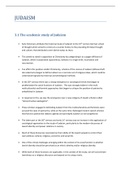3.1 The academic study of Judaism
Early historians attribute the historical study of Judaism to the 19th century German school
of thought which aimed to construct a counter history to the prevailing Christian thought
and culture, that attributed a semi divine status to Jesus.
This aimed to stand in opposition to Christianity by categorizing it as a pagan offshoot of
Judaism, which incorporated superstitious, believes in a virgin birth, incarnation and
resurrection.
Too affirm this position amidst Christianity, scholars of the science of Judaism (Wissenchaft
des Judentums) began to define Judaism as a concrete set of religious ideas, which could be
understood logically by historical and philological methods.
In the 20th century there was a strong emergence or sociological trends that began to
problematize the social functions of Judaism. This was strongly evident in the multi
multiculturalist and feminist approaches that began to critique the position of patriarchy
embellished in Judaism.
In response to this, we saw the emergence over a new category of Jewish scholars called
“deconstructive apologetics”.
These scholars engaged in defending Judaism from the multiculturalists and feminists were
accused the Jews of patriarchy, while at the same time challenged modern Jewish scholars
that forced a patriarchal rabbinic agenda and portrayed Judaism as non-progressive.
The latter part or the 20th century and early 21st century saw an increase in the application of
sociological approaches to the study of Judaism, particularly to the modern discourses of
Jewish identity and power relations in society.
Much of these discourses resonated on their ability of the Jewish people to control their
own political, cultural, religious, economic and social life.
One of the critical challenges emerging within the context of its social function is whether
Jewish identity should be perceived as an ethnic identity and/or religious identity.
While both of these functions are applicable, in the context of the study, we will concentrate
Jewishness as a religious discourse and expand on its unique traits.
,3.2 Basic beliefs in Judaism
Does not have a formal dogma/ set of beliefs that one must hold to be a Jew.
It is noted that orthopraxy are more important than orthodoxy.
The closest to a wildly accepted list of Jewish beliefs is the “Thirteen principles of faith”,
articulated by the medieval Jewish scholar Rabbi Moshe ben Maimon:
1. God is the creator of all things and he alone;
2. God is one with a unique unity;
3. God is without body or any physical form;
4. God is eternal;
5. It is only proper to pray to God and not anyone or anything else;
6. All the words of the prophets are true;
7. Moses is the chief of all prophets:
8. The present Torah is the one given to Moses;
9. The Torah will never be changed and nothing similar will come forth;
10. God knows all the deeds and thoughts of humanity;
11. God rewards those who keep his commandments and punish those who
transgress him;
12. A messiah will come forth; and
13. The dead will be resurrected
, 3.2.1 Belief in one God
The first place and most important beliefs in Judaism is the affirmation of the existence of
one supreme deity - monotheism, omnipotent, omniscient, and without limitations or form.
God is regarded as the only creative cause of existence and everything has come into
existence by his will.
God is described as having five central attribute human qualities (anthropomorphism), which
is that of a father;
The second describes a God who is different from the created world and
cannot be identified with any aspect of creation (transcendentalism).
The third describes a God who is present in everything (immanentism).
The fourth describes a God who forms a covenant relationship with the
people of Israel and his chosen people (particularism).
The fifth extends to a God or all creation (universalism), who is regarded as
an active participant in human affairs and not limited to that of Israel.
He is also to be perceived as a God encompassing anger and justice
In order to reap the benefit of a relationship with this God, his followers need to love him
and obey his commandments, if they disobey, there will be reciprocated with his anger and
justice.
3.2.2 The Chosen People
According to Jewish tradition, God revealed is set of laws/commandments to Moses or
Mount Sinai, which has to be delivered to his people
These laws served as instructions to suppress their potential for evil
By accepting these laws as God’s instructions for correct livelihood, the Jews entered into a
covenant relationship with God as his chosen people


